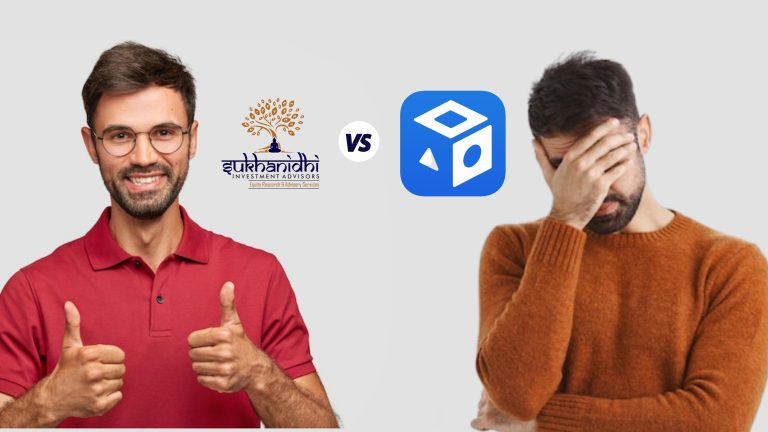Why Are Investors Not Happy With Smallcase?

Smallcase Is Out. Here’s What’s In…
Despite the global pandemic and market disruptions, Indian investors opened 14.2 million new Demat accounts in FY2021, a record. It is nearly three times higher than in the previous fiscal year. Most stock market investors believe they can grow their portfolios and multiply their wealth without professional assistance. And if they do require advice, they prefer free advice from friends, relatives, or brokers. They also now encounter a barrage of finance influencers from YouTube. What happens when the chips are down? Will these friends or influencers support you? My friend Arun who aspired to be a ‘DIY’ investor encountered one such incident.
Arun, a 32-year-old Bangalore-based techie, wanted to join the stock market bandwagon as well. To generate alpha, he decided to invest in smallcase, which was recommended by a popular YouTuber. While investing as advised by the smallcase manager, he had no idea his savings were about to plummet. The returns projected were not accurate, and there were additional costs of GST and STT incurred as a result of portfolio rebalancing and churning every three months. He barely achieved inflation-adjusted returns. Arun learned his lesson after burning his fingers. Only if he had known of a better option.

What is a smallcase?
Smallcase, to the uninitiated, is a pre-made selection of stocks or ETFs that is based on basic ideas or reflects a strategy or theme. They can be purchased through a broker much like stocks. Trades are subject to brokerage, and a Demat account is required.
Difference between Sukhanidhi Elite Equity Portfolio and Smallcase
Selecting the right adviser who can create a portfolio that is unique to you and only YOU is critical. Being a SEBI Registered Investment Advisory, Sukhanidhi recognizes that an investor’s journey is crucial. For all the “DIY” investors these are the reasons why you should opt for Sukhanidhi in your investment journey :
Sukhanidhi’s Elite Equity Portfolio | Smallcase |
Fiduciary responsibility As a SEBI-registered advisor, Sukhanidhi is obligated by fiduciary duty to prioritize their client’s interests because they can be held liable if they provide incorrect advice or breach their client’s trust. | Lack of accountability In smallcase, forget fiduciary responsibility. If there is any issue, support is only available via chat or email; You can’t even connect with anyone over a phone call |
Offers realistic expectations Sukhanidhi will show you the long-term and realistic picture in terms of CAGR over a 5–10-year period, so you know what you’re getting into and aren’t swayed by the market’s short-term ups and downs and aren’t disappointed. | Distorted Returns You may only have back-tested returns and risk indicators to go by when selecting smallcases. Another issue is that a few smallcases from this year have vanished since they do not want you to be aware of the history of their appalling performances. |
Transparent and helps save money They only charge a fee for their consultation. It could be a fixed fee or a fixed percentage of Assets Under Advisory (AUA), and they do not earn commission on the stocks they recommend or charge a performance fee, ensuring you receive completely unbiased and reliable advice. Even before the engagement begins, the type of fee will be disclosed. As a result, you wind up saving a significant amount of money that you would have spent on brokerage, transaction fees, taxes, etc., which balances out the cost of the advisor’s fee. | Uneconomical pricing The smallcase manager will charge a fee, which could be either a fixed cost or a variable cost based on asset value. A significant amount of capital gains, particularly short-term capital gains, are anticipated to result from putting the manager’s regular recommendations into practice adding to that constant churning of the portfolio which brings additional charges |
Time-tested investment styles and strategies As your advisor, Sukhanidhi will implement tried-and-true investment styles and strategies to construct the appropriate equity portfolio based on your long-term financial objectives, such as retirement, wealth creation, or even the education of your grandchildren. It is a step-by-step procedure that typically includes:
| Only thematic, no strategic Smallcase is merely like a Robo-Advisory trend that started a few years back. It has no personal touch from the investor’s perspective. An investor might not be aware of what is suitable for them given their circumstances, objectives, risk tolerance, etc. With smallcase, an investor is more likely to indulge in their imaginations of themes and concepts because the emphasis is on returns rather than actual life objectives. The stocks they ultimately select might not be appropriate for their risk profile or circumstance. |
Stands with you in good and bad markets Sukhanidhi can help you see the big picture rather than allowing you to be influenced by emotions during good or poor market periods. For instance, many uninformed investors lost a lot of money when the stock markets plummeted during the first wave of COVID-19. They panicked and sold all of their stock holdings. Sukhanidhi, however, seized the chance to diversify their client’s portfolio with high-quality equities by considering their long-term potential. | You are on your own Smallcase investing requires constant research and understanding of companies and markets. You should be able to handle all the ups and down of the market by yourself and trust your conviction |
Relax, we got this You will have spare time and won’t need to worry about your portfolio while Sukhanidhi works on your behalf. | Constant monitoring There is a significant amount of investor involvement in smallcase. Many of the recommendations the smallcase manager occasionally offers to investors may go unacted upon because of their busy schedules. Therefore, at the end of a period, the return they receive can be very different from what the manager claims are the return from his portfolio. |
The most important thing when investing is personal trust. Sukhanidhi was primarily established with the intention of ‘holding’ the investor’s hand throughout his investment journey and forming a strong bond. It’s not a one-size-fits-all approach like smallcase. Every portfolio is unique, and it should be tailored to the investor’s needs accordingly.
All things considered, smallcase appears to be a fad that provides a plethora of options and adds some excitement to investing. However, this does not imply that it is a product that is a good fit for one’s context and situation. Buying ready-made is a convenient option, but it is up to you to determine whether the style and fit are appropriate for you. And if you want to know what style is best for you, contact us right away.
About Author

Vinayak Savanur
Founder & CIO at Sukhanidhi Investment Advisors, a SEBI registered equity investment advisory firm. He has nearly a decade of experience in the stock markets and has been a holistic financial planner.
We send you fresh and insightful finance newsletter every week. Subscribe here to never miss an update. To explore great investment opportunities in Direct Equities, give us a call at 
The ₹26,000 Crore Deathcare Industry in India: A Comprehensive Guide for Building With Compassion and Purpose!
The ₹26,000 Crore Deathcare Industry in India: A Comprehensive Guide for Building With Compassion and Purpose! India’s startup landscape has evolved from food delivery and
MARKETS WHISPER, THEY DON’T SHOUT – A TIMELESS LESSON IN PATIENCE AND PERSPECTIVE!
MARKETS WHISPER, THEY DON’T SHOUT – A TIMELESS LESSON IN PATIENCE AND PERSPECTIVE! When the Market Tests You, Stay Still April 7th, 2025, will be
AI CAN PREDICT MARKETS—BUT IT CAN’T PREDICT YOUR LIFE: WHY YOU STILL NEED A CERTIFIED FINANCIAL PLANNER (CFP®)
AI CAN PREDICT MARKETS—BUT IT CAN’T PREDICT YOUR LIFE: WHY YOU STILL NEED A CERTIFIED FINANCIAL PLANNER (CFP®) We’re living in the age of intelligent


